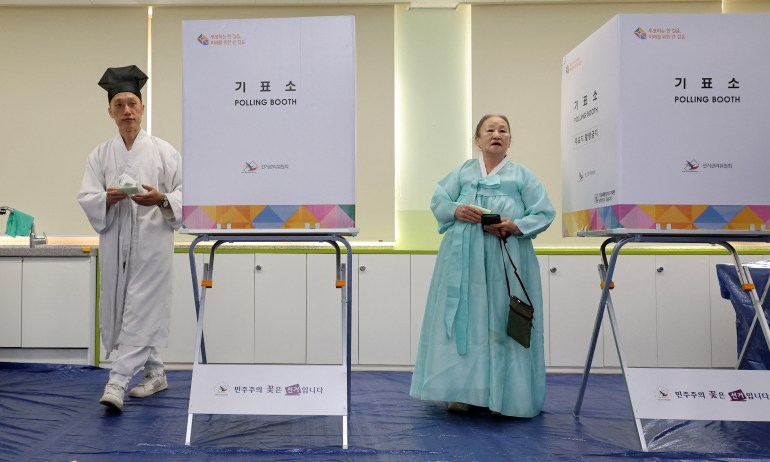
[ad_1]
South Korean voters could punish the ruling conservative party at the ballot box amid discontent over Yoon’s leadership.
Voting is under way in South Korea in parliamentary elections seen as a referendum on President Yoon Suk-yeol amid frustration about the cost of living and corruption.
Polls opened at 6am (19:00 GMT) on Wednesday and will remain open until 6pm (09:00 GMT). The country’s 44 million voters are choosing who will sit in the 300-seat National Assembly, with 254 members elected through direct votes in local districts and the other 46 allotted according to party support.
At a polling station in Seoul’s Gwangjin District, voters queued to have their identity documents checked and receive their ballot papers before heading into the polling booths to vote.
Opinion polls are mixed and election observers say candidates in about 50 to 55 local districts are in neck-and-neck races, making them too close to call.
“President Yoon has said a priority would be given to stabilising prices and livelihoods, but they weren’t stabilised, so I think that will be a big negative for the Yoon government during the election,” Kim Daye, a 32-year-old Seoul resident, told the Associated Press news agency.
Yoon, who narrowly beat the opposition Democratic Party (DP)’s Lee Jae-myung to the presidency in 2022, has struggled to push through his conservative policy agenda and is under pressure over a weeks-long doctors’ strike that has forced operations to be cancelled.
He is unpopular as a result of the “lack of real progress on domestic political and economic issues”, Andrew Yeo, a politics professor at the Catholic University of America, told the AFP news agency. “Prices and inflation remain high, housing is expensive, and political polarisation remains high.”
Corruption, disaffection
The DP had a majority in the outgoing assembly and has criticised Yoon and his conservative People Power Party (PPP) for mismanaging the economy and failing to rein in inflation.

PPP leader Han Dong-hoon, meanwhile, has said a big win by the DP, whose leader Lee Jae-myung is facing corruption charges, would create a crisis for the country.
Rebuilding Korea, a liberal splinter party led by former Justice Minister Cho Kuk, has emerged as a dark horse and is projected to win at least a dozen seats despite offering few substantive policies of its own.
“I am going to make President Yoon first a lame duck, then a dead duck,” Cho told the AFP earlier this month.
Cho is himself facing jail time for corruption charges that he denies.
The DP’s Lee is also on trial for fraud, while Yoon has been embroiled in a scandal over his wife’s decision to accept a designer Dior bag as a gift and the appointment of a former defence minister as South Korea’s ambassador to Australia even while he was under investigation for corruption.
Demographics could help Yoon, however, with voters aged 60 and older – seen as more conservative – now outnumbering those in their 20s and 30s.
Many younger voters are less likely to vote, with many saying they are put off by a political class dominated by older men who ignore their concerns.
They are also struggling economically, with cut-throat competition in education, fewer job opportunities and sky-high housing costs.
Yoon has three more years to serve of his single term in office. The National Assembly will serve a four-year term.
Chung Jin-young, a former dean of the Graduate School of Pan-Pacific International Studies at Kyung Hee University, predicts the opposition parties could win a combined 150-180 seats.
“That would cause a political deadlock for the Republic of Korea for the next three years, as both the ruling and opposition parties can’t pursue things unilaterally and won’t likely make terms with each other,” Chung said.
Exit polls will become available from about 6.30pm (09:30 GMT).
[ad_2]
Source link






